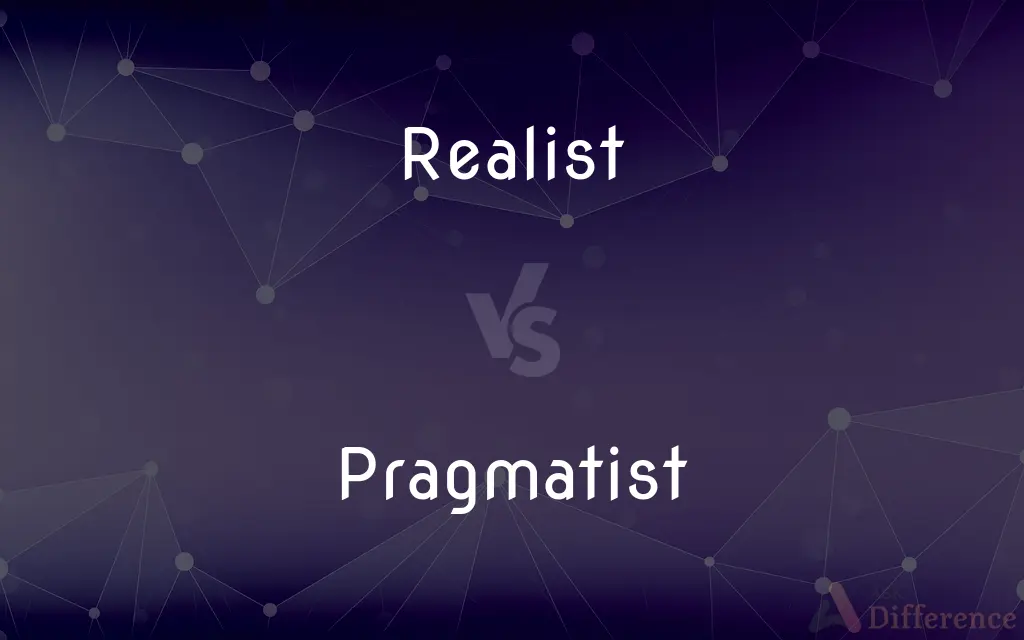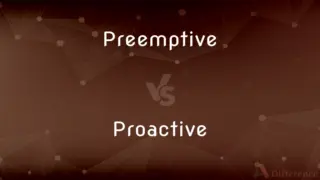Realist vs. Pragmatist — What's the Difference?
Edited by Tayyaba Rehman — By Maham Liaqat — Updated on April 26, 2024
A realist sees the world as it is, often focusing on practical truths, while a pragmatist focuses on practical approaches and results, emphasizing what works in real situations.

Difference Between Realist and Pragmatist
Table of Contents
ADVERTISEMENT
Key Differences
Realism is a philosophical stance emphasizing an objective perspective of reality as it truly is, without being influenced by emotions or false hopes. Whereas pragmatism is a philosophy that prioritizes practical outcomes and the effectiveness of actions in real-world applications.
A realist is often concerned with the factual and actual state of affairs, valuing accuracy and feasibility in assessments. On the other hand, a pragmatist is more concerned with what actions will lead to the best outcome, often considering various methods and their potential impacts.
Realists might focus on acknowledging and adapting to limitations or constraints that reality imposes. Meanwhile, pragmatists are inclined to find the most practical way to overcome these limitations, even if it means adapting their methods or expectations to suit the situation.
The approach of a realist can sometimes lead to pessimism, as they are keenly aware of the limitations and harsh realities of the world. Conversely, pragmatists often maintain an optimistic or solution-focused attitude, driven by the belief that there is always a practical solution that can be implemented.
Realists prioritize understanding the world as it truly is, which can influence their decision-making and planning by grounding it in reality. In contrast, pragmatists prioritize actions and plans based on their practicality and likelihood of success, often being flexible in their approach and ready to change tactics if necessary.
ADVERTISEMENT
Comparison Chart
Hilosophy
Focus on seeing things as they are
Focus on practical outcomes
Concerns
Factual state, feasibility
Effectiveness, practical methods
Typical Behavior
Acknowledges limitations
Finds ways to overcome limitations
Attitude
May be pessimistic
Generally optimistic
Decision-making
Grounded in reality
Based on practicality and success
Compare with Definitions
Realist
Often skeptical of overly optimistic plans.
His realist perspective made him wary of the new, untested marketing strategy.
Pragmatist
Optimistic about finding workable solutions.
Despite challenges, her pragmatist view fueled persistence to find a feasible solution.
Realist
Values accuracy and directness in assessment.
Her realist critique helped refine the team's overly ambitious plan.
Pragmatist
Believes in practical approaches and practical results.
As a pragmatist, he often chose the most efficient route to complete tasks, regardless of convention.
Realist
Adheres to the view that things should be viewed realistically and not how one might wish them to be.
As a realist, she didn't expect the troubled project to succeed without significant changes.
Pragmatist
Prioritizes what works best in the real world.
Her pragmatist solution to the scheduling conflict involved flexible work hours.
Realist
Can be seen as cautious or conservative in planning.
Realists in the company often push for more data before committing to new ventures.
Pragmatist
Adapts methods to achieve the best possible outcome.
The pragmatist in him appreciated software that could be customized to user needs.
Realist
Focuses on practical truths and factual reality.
The diplomat's realist approach avoided idealistic pitfalls in negotiations.
Pragmatist
Often flexible and ready to change strategies.
The pragmatist’s approach to business allowed quick pivoting in response to market changes.
Realist
One who is inclined to literal truth and pragmatism.
Pragmatist
One who acts in response to particular situations rather than upon abstract ideals; one who is willing to ignore their ideals to accomplish goals.
I'm not a thief, I am a pragmatist. I need this bread to feed my family.
We cannot trust him not to lie for his own gain: he's an opportunist and a pragmatist.
Realist
A practitioner of artistic or philosophic realism.
Pragmatist
(Philosophy) A movement consisting of varying but associated theories, originally developed by Charles S. Peirce and William James and distinguished by the doctrine that the meaning or truth value of an idea or a proposition lies in its observable practical consequences.
Realist
(philosophy) An advocate of realism; one who believes that matter, objects etc. have real existence beyond our perception of them.
Pragmatist
A practical, matter-of-fact way of approaching or assessing situations or of solving problems.
Realist
One who believes in seeing things the way they really are, as opposed to how they would like them to be.
Pragmatist
One who acts in a practical or straightforward manner; one who is pragmatic; one who values practicality or pragmatism.
A pragmatist would never plant such a messy tree, but I like its flowers.
Realist
An adherent of the realism movement; an artist who seeks to portray real everyday life accurately.
Pragmatist
One who belongs to the philosophic school of pragmatism; one who holds that the meaning of beliefs are the actions they entail, and that the truth of those beliefs consist in the actions they entail successfully leading a believer to their goals.
Realist
One who believes in realism; esp., one who maintains that generals, or the terms used to denote the genera and species of things, represent real existences, and are not mere names, as maintained by the nominalists.
Pragmatist
(politics) An advocate of pragmatism.
Realist
An artist or writer who aims at realism in his work. See Realism, 2.
Pragmatist
(linguistics) one who studies pragmatics.
Realist
A person who avoids unrealistic or impractical beliefs or efforts. Contrasted to idealist or visionary.
Pragmatist
(politics) Advocating pragmatism.
Realist
A philosopher who believes that universals are real and exist independently of anyone thinking of them
Pragmatist
One who is pragmatic.
Realist
A person who accepts the world as it literally is and deals with it accordingly
Pragmatist
An adherent of philosophical pragmatism
Realist
A painter who represents the world realistically and not in an idealized or romantic style
Pragmatist
A person who takes a practical approach to problems and is concerned primarily with the success or failure of her actions
Common Curiosities
What is the core difference between a realist and a pragmatist?
The core difference is that realists focus on understanding and dealing with the world as it is, while pragmatists focus on achieving the most practical and effective outcomes.
Can a person be both a realist and a pragmatist?
Yes, it's possible for someone to combine both views, using a realistic assessment of circumstances to guide pragmatic action.
How do realists and pragmatists approach decision-making differently?
Realists base decisions on a thorough assessment of the current facts and truths, while pragmatists make decisions based on what actions will lead to the best practical outcomes.
How does a realist view challenges?
A realist views challenges as realities that need to be acknowledged and addressed based on their true nature.
What is a typical pragmatic approach to problem-solving?
A pragmatic approach involves using whatever methods are most likely to succeed, often using a trial-and-error method to find the best solution.
What philosophical roots does realism have?
Realism has roots in philosophical traditions that emphasize an objective understanding of the world, such as those found in some ancient Greek and modern Western philosophies.
Is pragmatism always the most effective approach?
Pragmatism is often effective, especially in dynamic or complex situations, but it may not always be suitable when long-term principles and goals must be upheld.
Does pragmatism imply a lack of principles?
Not necessarily; pragmatists can be very principled but choose to focus on outcomes rather than rigidly adhering to methods.
How does a pragmatist handle unforeseen problems?
Pragmatists handle unforeseen problems by adapting their strategies to include new information and choosing the most effective path forward.
How might a realist and a pragmatist view technological innovation?
A realist might focus on what is currently achievable with technology, while a pragmatist would explore how new technologies can be pragmatically applied for immediate benefits.
Can realism lead to negative attitudes?
Sometimes, focusing too much on realism can lead to pessimism if the reality is perceived negatively.
Are pragmatists generally more successful in business?
Pragmatists can be very successful in business due to their focus on practical outcomes and flexibility in strategy.
What drives a realist in professional settings?
In professional settings, realists are driven by realistic assessments of resources, capabilities, and limitations.
How do educational approaches differ for realists versus pragmatists?
Educational approaches for realists focus on understanding fundamental truths and theories, while pragmatists emphasize application and practical skills.
Which approach is better in crisis management?
Both can be effective: realists in understanding the exact nature of the crisis, and pragmatists in implementing flexible and rapid responses.
Share Your Discovery

Previous Comparison
Preemptive vs. Proactive
Next Comparison
Attendee vs. AbsenteeAuthor Spotlight
Written by
Maham LiaqatEdited by
Tayyaba RehmanTayyaba Rehman is a distinguished writer, currently serving as a primary contributor to askdifference.com. As a researcher in semantics and etymology, Tayyaba's passion for the complexity of languages and their distinctions has found a perfect home on the platform. Tayyaba delves into the intricacies of language, distinguishing between commonly confused words and phrases, thereby providing clarity for readers worldwide.














































